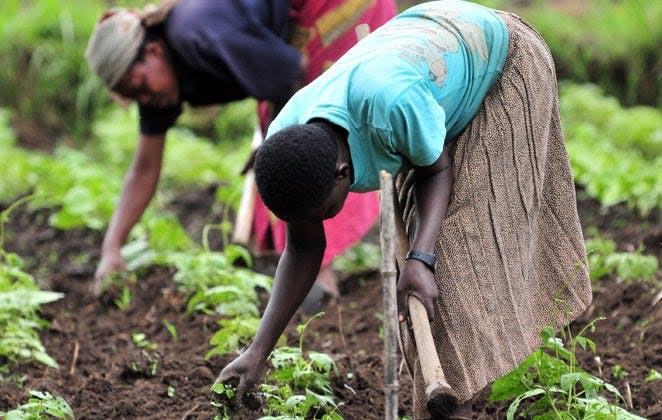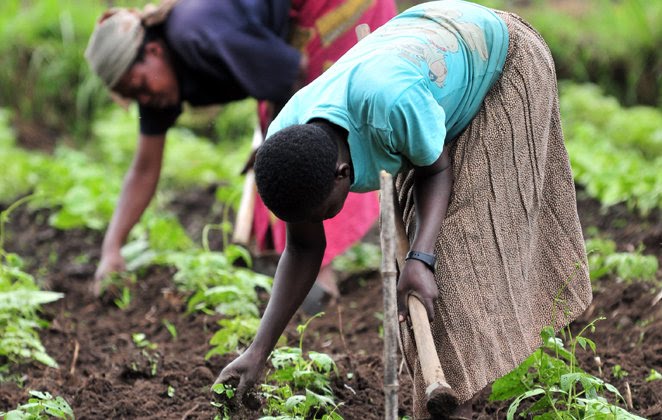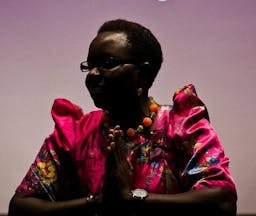Land ownership --- Hope for the Women
Jan 21, 2015
Story


To you Michelle Bachelet and to UN Women:
Great opportunity to virtually shake hands with you. Greetings and well-done for all you have achieved and those yet to achieve!
It is more than the labour pains God apportioned to Eve , us the women, it is double portion punishment now, eating through our sweat. Women are now the bread winners at all levels. Leave that alone, I am burning with land ownership, on behalf of widows, women and girls especially. In my country Uganda Agriculture is the backbone of the economy.According to IFAD study under the Gender Strengthening Programme for Eastern and Southern Africa, agriculture is the main source of income for rural households in Uganda. It is also the main occupation of women. 72% of all employed women and 90% of all rural women work in agriculture. Only 53% of rural men do so. If you apportion Uganda in this statistic 92% of women are the agriculturalists compared to 8% men.
Who would be the rightful land owners?
The current bill does not help to empower women to own land like their spouses, women’s rights to own and control land are not reflected in the current policy and legal framework related to it.
There is lack of formal land ownership by women, the majority of women do not have land of their own because in most cases, even when they save money to purchase land, land agreements are written in their husband’s names and the woman signs only as a witness. At the end of the day they are denied the ownership. My aunt Nyamwenge aged 72 is a victim of this circumstance, she bought 7 acres of land in Mukono, Uganda, her husband signed every document, she was merely a witness, as I write this the husband is chasing her away from her hand, He, the husband married a second wife who had 6 sons, my aunt has only one son. Things are turning sour on her side, who can help in this situation?
Grassroots women are not adequately consulted on land policy and the majority of those participating do not have knowledge of the ongoing land reform processes. In most cases, only women in decision-making positions have knowledge of or could report having participated in the reform process.
It does not help matters that the prevailing cultural attitudes discriminate against women. To most policy-makers and women in more privileged social positions, the current land laws accords a lot of protection to women; however, it is obvious that rural, illiterate women have not similarly benefited from the policies that are in place. Women in rural communities are still largely at the mercy of customary practices and traditional legal systems that most often look to men as sole owners of property, including land.
As far as land inheritance is concerned, the legally-sanctioned ways in which land is acquired tend to favour men. Inheritance is a challenge because most often land and property is passed down through the male line, reinforcing women’s exclusion and lack of economic empowerment. While for some segments of Ugandan society the old traditions are changing, the vast majority of Ugandan women continue to be unable to inherit land.
Access to justice also remains elusive to most women. Women, particularly rural women, find it difficult to access and make use of the judicial systems because of the challenges within the justice sector such as bribery and corruption, as well as the high costs associated with managing and bringing cases. Besides the court process is slow.
Before colonialism, most of Uganda’s land was held communally, except in those areas where a system of feudalism had begun. Women in the pre-colonial era, upon marriage, had access to land on which they had exclusive rights to cultivation. They themselves owned the fruits of their labour, namely the crops they produced from the land. However, as a result of the Buganda Land Agreement of 1900, which parceled out land in Buganda, land control shifted from clans to chiefs, and some of it was retained as Crown Land.
In the late 1990s, major legal reforms took place in the country, starting with the promulgation of the 1995 Constitution. The Government has focused on the design of policies and programmes that are gender-sensitive and speak to the needs of Uganda’s women. Chapter 4 of the Constitution (and in particular articles 31–33) provides for equality between men and women, including in respect to the acquisition and holding of land. Under Article 31 (1) of the Constitution, men and women above the age of eighteen years are accorded equal rights in marriage, during marriage and at its dissolution.
These provisions on equality are further strengthened by the principles of affirmative action, provided for under Articles
21, 32 and 33 of the Constitution, which seek to remedy the historical discrimination. Despite these provisions, women still suffer discrimination when it comes to land ownership.
TheNational Land Policy should fully reflect and embrace women’s right to equality in access, ownership and control of land, and when finalized should be used as a basis to amend and reconcile other relevant laws so that the concerns and interest of marginalized and vulnerable people, particularly women, are fully and comprehensively addressed by the legal framework in Uganda.
The Land Act and the Succession Act, for example, should be harmonized to provide adequate protection to widows and women whose marriages may have ended.
The State should work in collaboration with civil society organizations to translate the National Land Policy into indigenous languages and engage community leaders to disseminate it broadly. This information must be communicated in a way that is clear, accessible, and easy for grassroots women to understand.
I call for Land ownership and rights education to the grassroots communities throughout Uganda and the entire developing world.
Achieng Beatrice Nas
Uganda
As the United Nations Entity for Gender Equality and the Empowerment of Women officially begins its work this month, World Pulse is asking women worldwide: What is YOUR vision and recommendation for UN Women? We invite you to raise your voice by writing a letter to UN Women Executive Director Michelle Bachelet outlining your recommendation for how this new UN agency can truly affect change on the ground to promote gender equality and uphold the rights and needs of women both on a local and global scale.
Learn more: http://www.worldpulse.com/pulsewire/programs/international-violence-agai...




